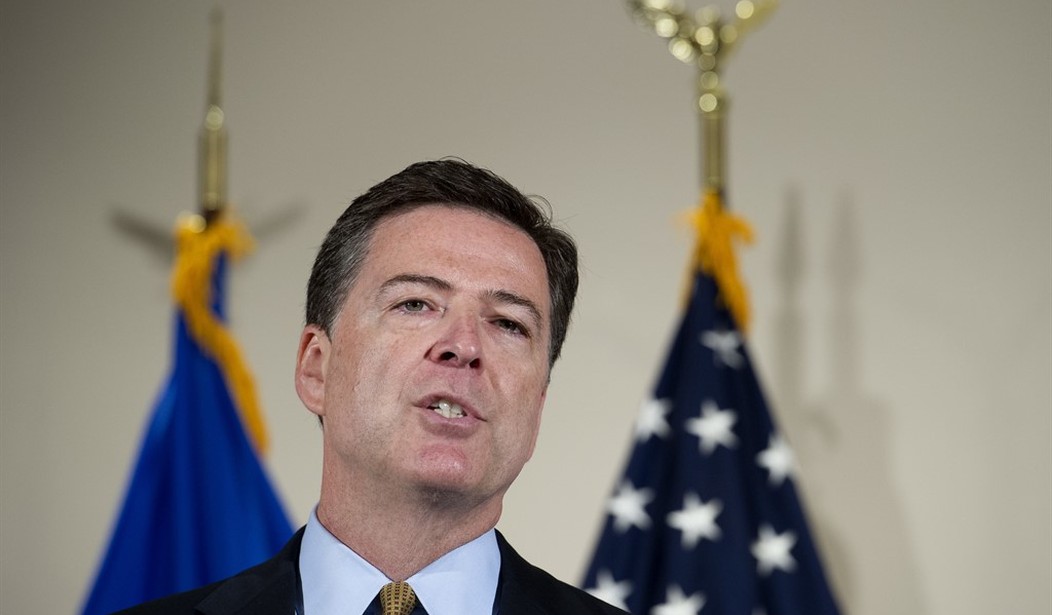UPDATE: Via The Hill, Attorney General Loretta Lynch has been asked to appear before the Oversight Committee next week:
Lynch is slated to testify before the House Judiciary Committee next Tuesday, the panel announced — her second testimony before the panel since becoming the nation's top law enforcement official last year.Her testimony will come just days after Republicans have FBI Director James Comey testify on Capitol Hill regarding the FBI's decision, announced Tuesday, to not recommend criminal charges for Clinton over her use of a private email account and server while secretary of State.
Days after FBI Director James Comey announced that no criminal charges would be recommended to be brought forward against former Secretary of State Hilary Clinton over her email use, the House Oversight Committee would like to ask him a few questions relating to the agency’s investigation; Katie noted this development earlier today. The investigation into the former first lady’s email usage reached new fervor before the Fourth of July weekend when Bill Clinton met with Attorney General Loretta Lynch privately on her plane for 30 minutes in Phoenix. There were allegations that political interference was at play, as some sources said Clinton delayed departure time in order to foster a run in with the attorney general (via Politico):
FBI Director James Comey will testify on Capitol Hill Thursday regarding the bureau's investigation of Hillary Clinton's email practices, part of a concerted GOP effort to keep the heat on Clinton heading into the party conventions and a long congressional recess.Comey will appear before the Oversight Committee at 10 a.m., House Oversight Committee Chairman Jason Chaffetz (R-Utah) said on Wednesday morning. The hearing will be just two days after Comey's stunning repudiation of Clinton's "extremely careless" practice of using a private email server to send classified information during her tenure as secretary of State. Comey did not recommend charges be filed against her, stoking GOP outrage and propelling congressional leaders like Chaffetz to seek more information.
Chaffetz's Senate counterpart, Homeland Security and Governmental Affairs Committee Chairman Ron Johnson (R-Wis.), demanded a written explanation of Comey's decision-making on Wednesday. And House Judiciary Chairman Bob Goodlatte (R-Va.) said that Attorney General Loretta Lynch will testify next Tuesday before his panel about Clinton's email practices, as well as Bill Clinton's private meeting with Lynch in late June.
The flurry of action highlights the GOP's exasperation over Comey's decision not to recommend an indictment despite his harsh words for Clinton.
Recommended
This is what Comey said during his briefing yesterday:
From the group of 30,000 e-mails returned to the State Department, 110 e-mails in 52 e-mail chains have been determined by the owning agency to contain classified information at the time they were sent or received. Eight of those chains contained information that was Top Secret at the time they were sent; 36 chains contained Secret information at the time; and eight contained Confidential information, which is the lowest level of classification. Separate from those, about 2,000 additional e-mails were “up-classified” to make them Confidential; the information in those had not been classified at the time the e-mails were sent.[…]
Although we did not find clear evidence that Secretary Clinton or her colleagues intended to violate laws governing the handling of classified information, there is evidence that they were extremely careless in their handling of very sensitive, highly classified information.
For example, seven e-mail chains concern matters that were classified at the Top Secret/Special Access Program level when they were sent and received. These chains involved Secretary Clinton both sending e-mails about those matters and receiving e-mails from others about the same matters. There is evidence to support a conclusion that any reasonable person in Secretary Clinton’s position, or in the position of those government employees with whom she was corresponding about these matters, should have known that an unclassified system was no place for that conversation. In addition to this highly sensitive information, we also found information that was properly classified as Secret by the U.S. Intelligence Community at the time it was discussed on e-mail (that is, excluding the later “up-classified” e-mails).
None of these e-mails should have been on any kind of unclassified system, but their presence is especially concerning because all of these e-mails were housed on unclassified personal servers not even supported by full-time security staff, like those found at Departments and Agencies of the U.S. Government—or even with a commercial service like Gmail.
That seems like gross negligence, which is a provision within federal law concerning handling of classified materials.
Pretty much everyone slammed both Clinton and Lynch for this rendezvous, labeling it as an inappropriate meeting. And many eyebrows were raised when Lynch said they mostly discussed grandchildren and golf for a half hour. Cortney wrote on Saturday that Clinton met with FBI officials for a three-and-a-half hour interview. On Tuesday, Comey announced that while Clinton and her team were extremely careless regarding handling classified information, including 110 emails deemed classified on 52 separate email chains, among other things, they were not going to suggest she be charged. In the fallout from the tarmac meeting, Lynch said she would follow whatever recommendations the FBI and the attorneys at the Department of Justice bring to her desk at the conclusion of this investigation.
This, coupled with Comey’s damning briefing to Clinton and her team’s abysmal culture regarding safeguarding sensitive information, has only intensified feelings from some that political influence was applied—and that Clinton has lied from day one since the beginning of this email fiasco .
























Join the conversation as a VIP Member